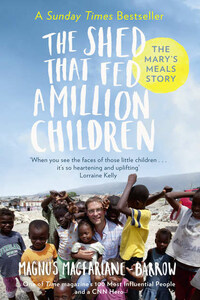William Collins
An imprint of HarperCollinsPublishers
1 London Bridge Street
London SE1 9GF
www.WilliamCollinsBooks.com
This eBook first published in Great Britain by William Collins in 2015
Copyright © Magnus MacFarlane-Barrow 2015
Magnus MacFarlane-Barrow asserts the moral right
to be identified as the author of this work
A catalogue record of this book is
available from the British Library
All rights reserved under International and Pan-American Copyright Conventions. By payment of the required fees, you have been granted the non-exclusive, non-transferable right to access and read the text of this e-book on screen. No part of this text may be reproduced, transmitted, down-loaded, decompiled, reverse engineered, or stored in or introduced into any information storage retrieval system, in any form or by any means, whether electronic or mechanical, now known or hereinafter invented, without the express written permission of HarperCollins.
Source ISBN: 9780008127640
Ebook Edition © May 2015 UK ISBN: 9780007578337/ US ISBN: 9780008132712
Version: 2016-02-10
I am writing this in my father’s shed. An east wind is blowing from behind Ben Lui, whose snow-powdered flanks I can see through the window above my desk. Some of the cold air buffeting and moaning around my corrugated-iron shelter has found a way in. There is a draught gnawing my feet. I can hear someone using a power saw in the distance, perhaps my brother-in-law at the firewood, and every so often a tractor chugs down the track towards the farm.
We don’t know exactly when the shed was built. It was certainly here a long time before we arrived in 1977. It is clearly marked on a map, dated 1913, hanging in an old wood-panelled corridor of Craig Lodge (my favourite part of the house when it was our family home), meaning it has been standing here for over a hundred years. That the shed is quite clearly leaning to one side today is therefore easily forgiven and it is understandable, perhaps, that I can now hear something clanking in the wind on the roof above me.
Initially, after we arrived, it served as Dad’s garage and workshop. It was the perfect size for parking the old Land Rover, in which I would one day learn to drive. Later, he converted it into a playroom, surprising us one Christmas by opening its door to reveal a magnificent pool table. My brothers and I spent many hours enjoying that gift, while at the back of the shed, right outside my window, was our football pitch. Seumas, Fergus and I played for hours there every day, shooting at home-made wooden goals, our pounding feet creating a muddy, grassless strip. In the winter months, when the darkness arrived frustratingly early, we would sometimes turn on the lights of the shed and all the neighbouring outbuildings, in a desperate attempt to create enough illumination for at least a few extra minutes of play. Later, in our rather wild teenage years, friends would join us in the pool shed. Sometimes beer would be smuggled in. Once, when my parents were away, it was the catastrophic scene of the experimental sampling of my home-made cider. I had brewed this secretly, using apples from trees in the little orchard above where my own house stands today. I have never been able to drink cider since.
Later, after we had left home and Craig Lodge had become a Catholic retreat centre, the shed, for a few years, became a little ‘rosary factory’, where members of a resident youth community made prayer beads of various styles and colours. Then, in 1992, I asked Dad if I could borrow this shed, as well as the one next door, to store donations of aid that were arriving in response to a little appeal we were making for the refugees in Bosnia-Herzegovina. Of course he didn’t hesitate in saying yes. Indeed, he and Mum were doing most of the work involved in collecting and preparing the aid. Even if he had known then that he would never get either of his sheds back I believe he still would have agreed, mainly because he is a man more generous than any other I have met, but also because it would have given him an excuse to build some new sheds. Fortunately, this is something Dad loves to do. He is, in fact, a serial shed-builder.
Eventually, after serving for some years as a storage space for parcels of clothes, food, toiletries and medical equipment, the shed became our office, first for me as the sole employee of the charity, before I was joined by my sister Ruth and eventually a team of five. At this stage it was so cramped that some, without desks, worked with laptops on their knees. And so at this point Dad’s adjoining shed was demolished and he along with George, a very gifted friend of ours, constructed an amazing purpose-built timber office with their own hands. It is a thing of beauty and extremely practical too. But when the time came to move into the bright new office, I chose to stay here, in the old shed. This was a good decision. To some it may seem odd, perhaps even stupid, to retain the HQ of a global organization in this lopsided and tired-looking shed, in a very remote part of Scotland. But being here helps remind me how and why we began this work. Besides, I know some people, living in poverty, who would be deeply grateful to have a house as large and secure as this for their family to live in.









